| Website Exclusive • September, 2010 |
One day last summer, I departed Last-Chance Gulch and the high desert, a U-Haul trailer bobbing behind. I aimed for my beloved Pacific Northwest where a friend had found me a century-old house. I bought the place sight-unseen. The old one-and-a-half story would become mineand eventually I hope a fine place to livevia seller financing and future years of sweat equity.
The catch: My House Sweet House isn’t in the desert, or the woods, or any trackless wilderness. It’s on the edge of a perfectly civilized small town. No longer will power arrive via solar panels, friendly advice, and prayer; a local utility delivers it. There will be no more “water so hard it’s crunchy.” No more cisterns running dry because we forgot to plug in the well pump and run the generator. Just turn on the tap and out rushes pure, clear sweetness.
Of course, as any reader of Backwoods Home knows, civilized services put one at the mercy of civilization. Somebody else, and somebody else’s complex systems, have to work to bring such blessings. Why would anybody switch back after achieving off-grid independence? Well, my reasons were varied and some of them aren’t worth going into for this article. One was that I’m just not a desert person. Another is that, after 10 years of living in miniature spaces I was ready for a “real” house. But after watching (and sometimes participating in) the building projects around Last-Chance Gulch, I knew I didn’t want to build my own place from the ground up. Been there. Done that. No inclination to do it again.
But another reason for the move is that I really wanted to be in a small town, with all that that implies.
One of the first people I met after moving here announced that she was looking to sell her house in town as soon as possible and get out to “someplace remote.” By “remote” she didn’t quite mean what BHM readers mean by remote. But her motive is one you’d recognize: “To be far away when the welfare checks stop coming, the currency inflates, and all those people who expect something for nothing find out they’re going to starve.”
She was politely aghast when I told her I’d just moved in the opposite direction. But in my humble opinion, while an off-grid (or on-grid but rural) homestead can be an excellent place for the right people to survive hard times, so too can a small town.
Becauseparadoxicallyas much as survival is about independence, it’s also about dependence, and being dependableabout having and being good friends and good neighbors. It’s also about having access to supplies. And more “survival stuff” can be done in a town than some people like to think.
I grew up listening to my older relatives’ tales of the Depression. The main thing I learned was that nobodynobodycame out of that period unmarkedeven those who seemed not to suffer.
As it happens, on both my mother’s and my father’s side, the men of the families had solid jobs throughout the 1930s. None of my relatives lived in tent cities. Nobody rode the rails. Nobody had to pack their possessions atop an old truck and head west like the Steinbeck’s Joad family, in vain search of field work. Nobody sold apples on street corners or stood in bread lines. They got regular paychecks. Their children never went without.
My mother’s family, in fact, benefitted from the hard times. When an architect, who had designed a grand home for himself, went bust, my grandfather picked up the place for a song. He needed a house that big for the 20+ people who had to live in itmore than a dozen children, a handful of grandchildren, boarders, and occasional others.
The house was in a small town, and although I’ve always liked and often lived in such towns, perhaps the old family stories were part of what draws me back to one now.
My oldest aunts spoke of hoboes coming to their door, looking for work in exchange for food. They always made a distinction between hoboeshonest men, needy but still honorableand bumsscary men whose scruples, if they ever had any, had been lost along with their incomes. Grandma gave the hoboes yard work when she could, and emotionally scarred her children forever with the threat of bums and other terrifying strangers who might be lurking in any empty lot or behind any embankment.
There were bums in the neighborhood sometimes. And once there was a man and woman in a snazzy car who tried to lure one of my aunts (or so she believed) into a life of white slavery. So even though they lived comfortably, they grew up with an apprehension of strangers that never left them.
They also grew up with a sense of want that stayed with them to their graves. They were lifelong savers of bacon fat, tin foil, rubber bands, waxed paper, fabric scraps, cans, jars, cardboard, and any doodads that might ever have the slightest possibility of coming in handy. When I was a child, my mother made me snip the buttons and zippers out of old clothes before she donated the garments to charity. I complained bitterly and eventually refused to do it, considering it an act of miserliness that probably meant the Salvation Army would throw away all of Mom’s donations.
Now I understand where she was coming from. (But I’d still never stoop that low.)
The neighborhood of near-mansions my grandparents called home was full of other working-class families, living sometimes two-or-three households to a building. The rich had gone broke and fled. A few had committed suicide. So even though all these new people benefitted in one way or another from the tough times, they were acutely aware of the suffering that surrounded them and always afraid that their turn for a fall might come.
One Irish family named O’Toole attempted to raise itself to faux prosperity by insisting that everyone pronounce its surname as if it were FrenchAH-to-lay sounded so much more aristocratic. The neighbors just laughed at the pretension.
And of course they alleven the grand O’Tooleshad backyards full of chickens and vegetable gardens. And when Grandpa, on his way home from work one day, discovered a bargain on 100 pounds of overripe tomatoes, Grandma immediately went back into her kitchen that evening and got to canning. Never mind that she’d already spent all day being the only cook and caretaker for 16 rowdy youngsters. You didn’t pass up a bargain like that, and you didn’t let it go to waste.
Now, here in this pocket-sized neighborhood in this pocket-sized town, I awake every morning to roosters crowing from several directions. And more and more backyards are starting to change from flowers to corn stalks and tomatoes.
And I hear people, even many who aren’t at all personally needy, talking about cutting back, doing without, and banding together to get more or accomplish more than they can do alone. My very first “social engagement” here in the new town was to pile into a car with several people and haul little tin buckets out to a “u-pick” organic blueberry patch. Afterwards, some of the same people, and a few more, roamed out to a prime blackberry hedge and got to work together. The same woman who organized the berry picking took a look around and decided that she and her friends could all benefit from household work parties, too. So, instead of hiring contractors or gardeners for every little thing, as some might have a couple of years ago, a bunch of us will be “hiring” each other for weed-pulling, dry-walling, painting, and ripping-up-of-old-floors.
It’s true, as my fearful neighbor (the one who wants to flee for more remoteness) knows, that these are different times. Back in the 1930s, people were already used to doing without. Millions were more-or-less self-sufficient on family farms. And although “the dole” existed, being on it was a humiliation, not an “entitlement.”
Also, the government was much smaller. It was not only less a part of people’s lives, but what there was of government was more stable, less out-of-control, and less cosmically in debt. Grandma didn’t have to worry whether the pennies she saved would be inflated into worthlessness within a year…or two years…or whenever the terrible uncertainty might be inflicted upon her. She had some remnants left of trust in herself, her neighbors, and (however mistakenly) the state.
Today, we distrust all institutions, especially the government. And we may not know, and certainly don’t trust, most of our neighbors. We definitely don’t trust “those people”immigrants, or “welfare bums,” or people whose color or lifestyle is different than our own. Society feels (and probably is) much more fragile today than it was 80 years ago.
So I understand my neighbor’s fear of ravening hordes, having contemplated said hordes myself for many years.
Yet life in a small townand here I’m talking about a true, rural small town, not some bedroom community for a cityhasn’t changed that much. Nor have small-town people and small-town life.
Here are nine reasons why I think a small town is as good a place as any, for many of us, to survive hard times:
1. Most small towns already know all about hard times. For 60 years, the population has been migrating toward cities, shifting the economic and political power to urban areas. Long before the crash of ’08, long before the subprime debacle, small towns knew all about high unemployment, empty storefronts, and low real estate values. (Indeed, most small towns never experienced a real estate boom and were hardly hurt at all when the boom went bust.) Talk about preparedness! The typical small town is more prepared for hard economic reality than any other place, because hard times are what it knows best.
2. In a small town, chances are you can walk to a grocery store, a hardware store, a libraryor most anywhere else you want to go. Back on Ye Olde Independent Homestead, we had to put 24 miles of wear-and-tear on our vehicles if we needed a widget to repair the whoosis. Granted, we rationed our trips to town when possible. But even with the best planning, trips for supplies got costly. And they always required a functioning vehicle. Sometimes, you know, vehicles don’t function. Or you can’t afford fuel.
3. Because even the most independent homesteadisn’t. There are darned few people who can really provide for all their own needs. Even within the wider neighborhood that was Last-Chance Gulch, for instance, which stretched for miles and where we had fantastically resourceful and helpful neighbors, we still needed the propane man. And the road grading guy. And the solar-electric doctor. Not to mention the grocery store and the many other amenities of town.
4. The cost of living in a small town is less than in the city, and also (generally) less than on an independent homestead. Yes, once the infrastructure is in place and fully functioning, the 40-acre farm can earn its own way. But you can buy years of small-town electricity for what it costs to set up a typical solar-electric or wind-power system. You can enjoy years of small-town drinking water for an infinitesimal fraction of what deep well-drilling will cost youand fill plenty of jugs and barrels for emergency use. (Please keep in mind that I’m not knocking the independent homestead; I still love the idea of itand the silence of waking up in the morning and going to sleep at night without the racket of neighbors. I’m just saying it’s easier to make a start in a small town.)
5. For people interested in preparedness, if the prospect of building a rural homestead is simply too daunting, moving to a small town can be a cost-effective alternative or an easy first step. You can buy a lot of storage foods, water purifiers, and emergency light and power equipment with the money you might otherwise have spent on your city McMansion or the infrastructure for your hoped-for homestead.
6. Opportunities to barter, scrounge, and buy stuff real cheap are outstanding in small towns.
7. Wherever you are, good neighbors are one of the most important parts of your getting by in tough times. And wherever you are, there’s a certain amount of luck involved in getting them. But in a town, you have the advantage of having a lot of people who have the potential to watch your back. Sure, that may also mean there are more potential bums around. But just as in any true neighborhood, people will quickly get to know who’s trustworthy and who’s not and act accordingly. And although it’s sometimes a pain in the butt to have so many neighbors so near, it also makes it easier for somebody to spot something wronga fire, a break-in, a suspicious character lurking around, a leaky pipe.
8. People are generally better than we fear. Although I understand my neighbor’s apprehension, the fact is that most people don’t act like ravening zombies in hard times. They get creative and realistic. They find ways to do without or make do. They stop expecting life to hand them roses. If the checks quit coming, most peopleespecially in little townsaren’t immediately going to turn to looting and rioting. They start holding garage sales or offering to do yard work. Those who have help those who don’t, and those who don’tif they’re smart and ableget a grip and make themselves useful. Even in hellholes like Detroit, what are they doing now that their economy is completely shot? Turning vacant lots into community gardens. Not burning down the neighborhood. In a small town, you’ll be in a position to participate in and benefit from such creativity.
9. Because living in a small town can be just a very neat experience in general. You can drive on a paved street but still watch possums and deer. You can enjoy small-scale living without the sheer, bloody terror of feeling you have to do everything in life for yourself.
Oh, yes. If times get even worse than they already areif the currency collapses, the checks stop coming (or will only buy a loaf of bread), or whateversmall towns will have their dangers. As will independent homesteads. There will be “bums” who’ll use economic chaos as an excuse for riding roughshod over their neighbors. There will be thieves. There will also be decent, but unprepared, types who’ll panic.
But there will also be neighbors who are used to helping each other out. There will be truck gardens (well-defended, if need be). And a dozen chicken flocks per block. And carpools. And somebody who drives out to buy vegetables and meat from those independent homesteads and brings the product back for hometown folk to buy. Or independent homesteaders who drive into town to trade.


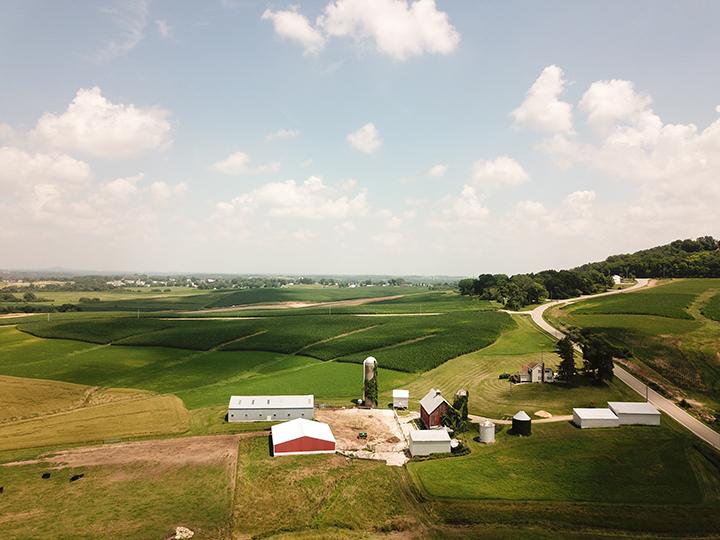

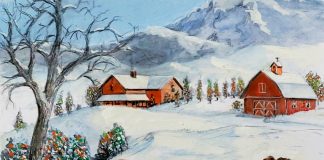




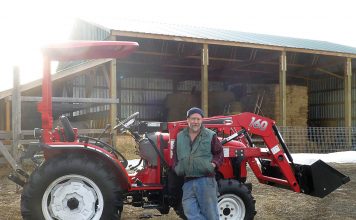

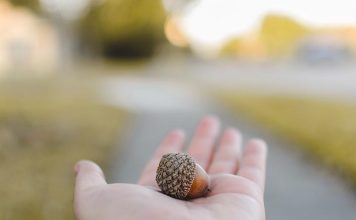

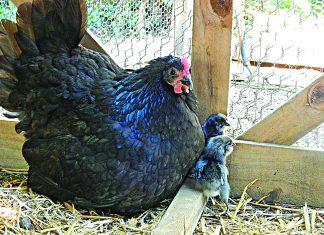

Wonderful article. My husband and I have always lived on the outskirts of civilization. Last July we sold our dream home and downsized to a house in the “city” (small town USA). Still not my favorite option so I needed to hear this.
Wonderful . And I agree..hard to find.
Claire,
Absolutely wonderful!
Well said! I live in a remote small town of 2100 people. For me, it is the best place to live. I have 3 acres in town. Most homes here have 1/3-1/2 an acre. Many people have gardens, chickens, and goats. People here are used to making-do with what they have.